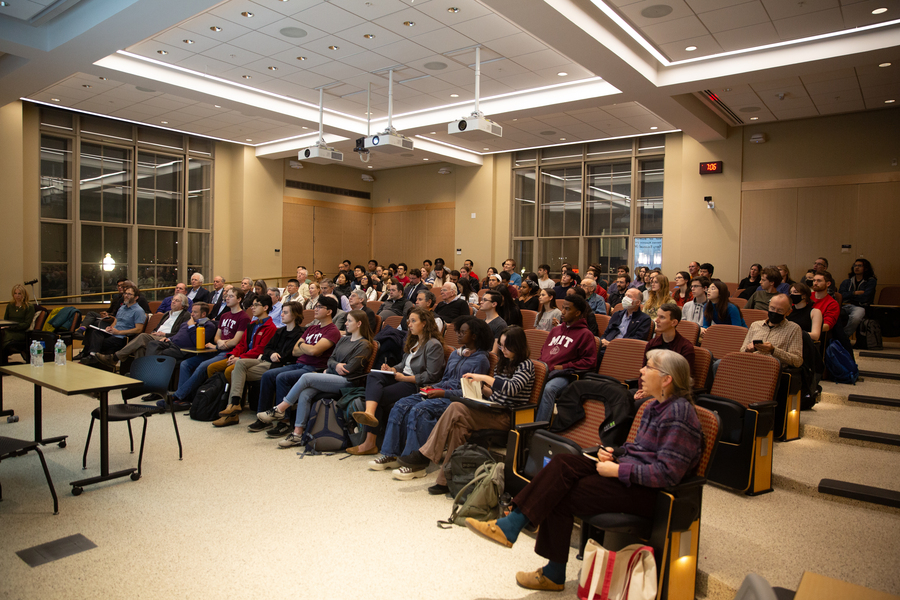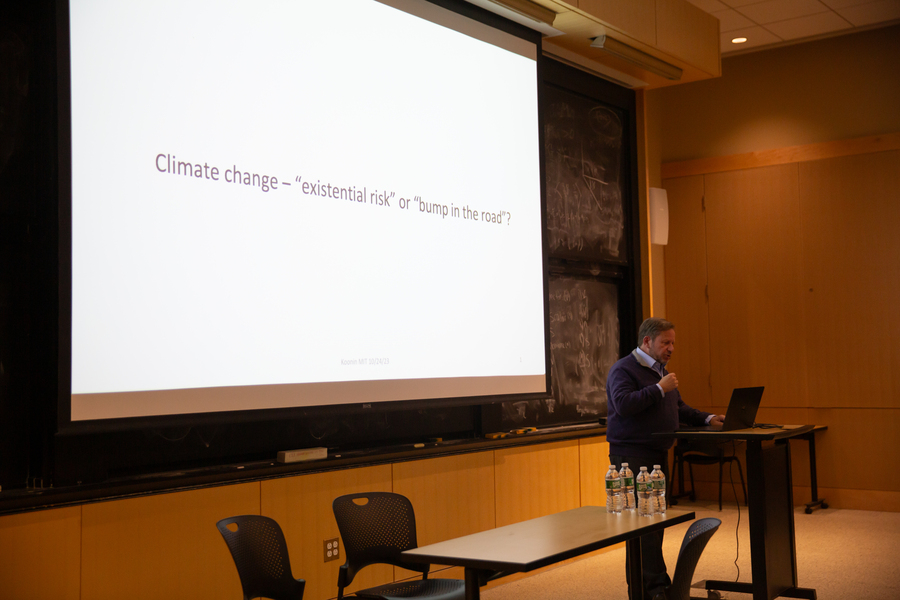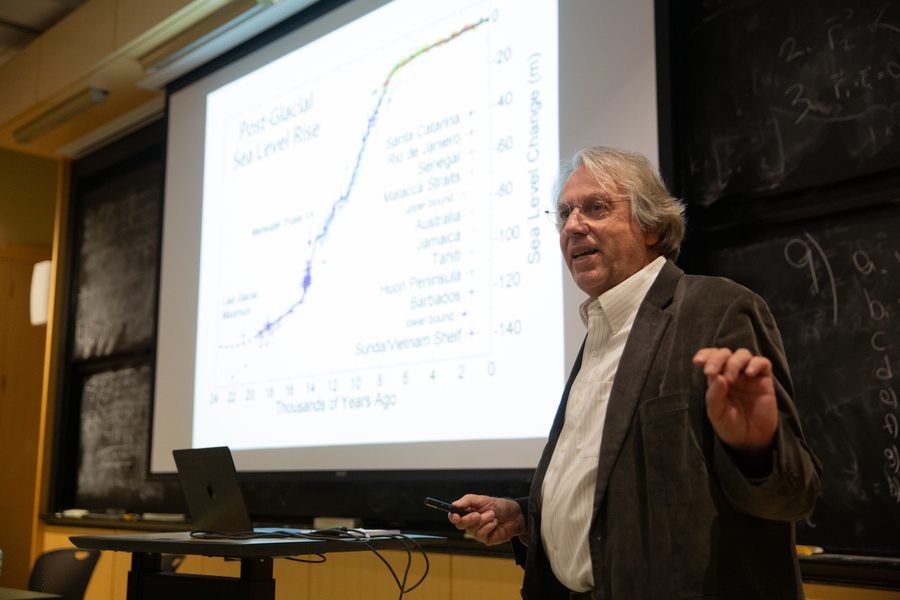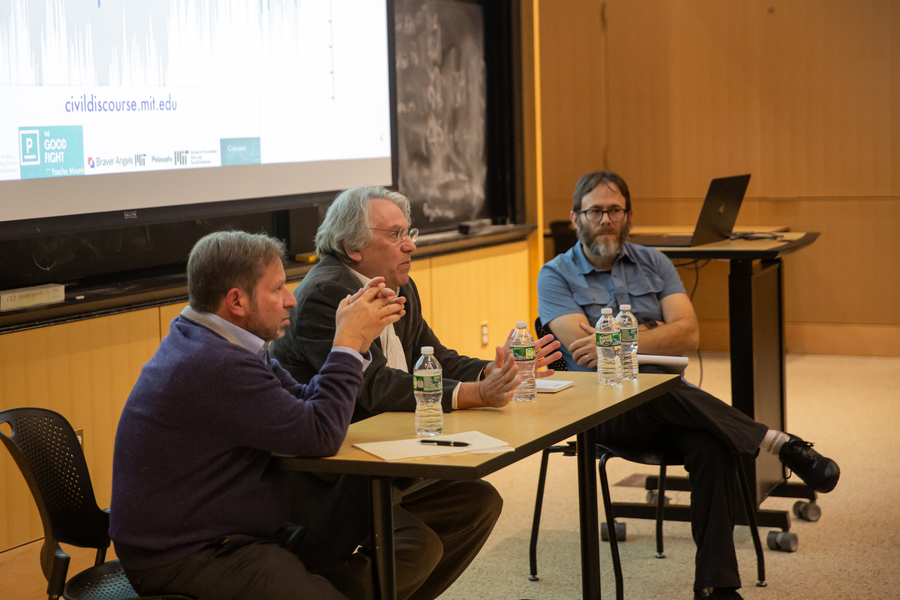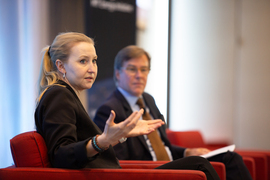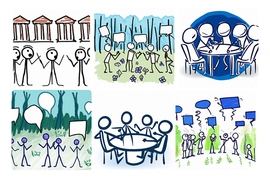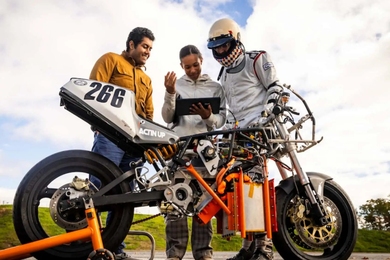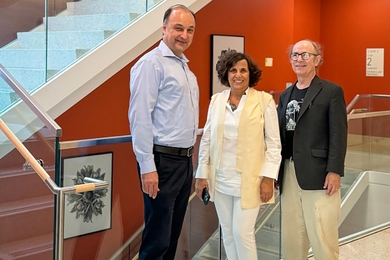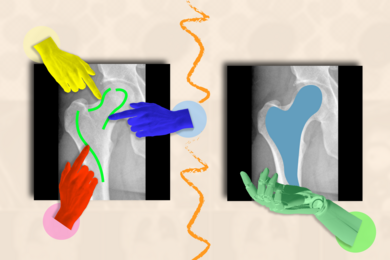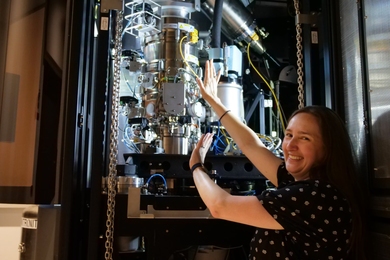A new MIT initiative designed to encourage open dialogue on campus kicked off with a conversation focused on how to address challenges related to climate change.
“Climate Change: Existential Threat or Bump in the Road” featured Steve Koonin, theoretical physicist and former U.S. undersecretary for science during the Obama administration, and Kerry Emanuel, professor emeritus of atmospheric science at MIT. A crowd of roughly 130 students, staff, and faculty gathered in an MIT lecture hall for the discussion on Tuesday, Oct. 24.
“The bump is strongly favored,” Koonin said when the talk began, referring to his contention that climate change was a “bump in the road” rather than an existential threat. After proposing a future in which we could potentially expect continued growth in America’s gross domestic product despite transportation and infrastructure challenges related to climate change, he concluded that investments in nuclear energy and capacity increases related to storing wind- and solar-generated energy could help mitigate climate-related phenomena.
Emanuel, while mostly agreeing with Koonin’s assessment of climate challenges and potential solutions, cautioned against underselling the threat of human-aided climate change.
“Humanity’s adaptation to climate stability hasn’t prepared us to effectively manage massive increases in temperature and associated effects,” he argued. “We’re poorly adapted to less-frequent events like those we’re observing now.”
Decarbonization, Emanuel noted, can help mitigate global conflicts related to fossil fuel usage. “Carbonization kills between 8 and 9 million people annually,” he said.
The conversation on climate change is one of several planned on campus this academic year. The speaker series is one part of “Civil Discourse in the Classroom and Beyond,” an initiative being led by MIT philosophers Alex Byrne and Brad Skow. The two-year project is meant to encourage the open exchange of ideas inside and outside college and university classrooms.
The speaker series pairs external thought leaders with MIT faculty to encourage the interrogation and debate of all kinds of ideas.
Finding common ground
At the talk on climate change, both Koonin and Emanuel recommended a slow and steady approach to mitigation efforts, reminding attendees that, for example, developing nations can’t afford to take a developed world approach to climate change.
“These people have immediate needs to meet,” Koonin reminded the audience, “which can include fossil fuel use.”
Both Koonin and Emanuel recommended a series of steps to assist with both climate change mitigation and effective messaging:
- Sustain and improve climate science — continue to investigate and report findings.
- Improve climate communications for non-experts — tell an easy-to-understand and cohesive story.
- Focus on reliability and affordability before mitigation — don’t undertake massive efforts that may disrupt existing energy transmission infrastructure.
- Adopt a “graceful” approach to decarbonization — consider impacts as broadly as possible.
- Don’t constrain energy supply in the developing world.
- Increase focus on developing and delivering alternative responses — consider the potential ability to scale power generation, and delivery methods like nuclear energy.
Mitigating climate risk requires political will, careful consideration, and an improved technical approach to energy policy, both concluded.
“We have to learn to deal rationally with climate risk in a polarized society,” Koonin offered.
The audience asked both speakers questions about impacts on nonhuman species (“We don’t know but we should,” both shared); nuclear fusion (“There isn’t enough tritium to effectively scale the widespread development of fusion-based energy; perhaps in 30 to 40 years,” Koonin suggested); and the planetary boundaries framework (“There’s good science underway in this space and I’m curious to see where it’s headed,” said Emanuel.)
“The event was a great success,” said Byrne, afterward. “The audience was engaged, and there was a good mix of faculty and students.”
“One surprising thing,” Skow added, “was both Koonin and Emanuel were down on wind and solar power, [especially since] the idea that we need to transition to both is certainly in the air.”
More conversations
A second speaker series event, held earlier this month, was “Has Feminism Made Progress?” with Mary Harrington, author of “Feminism Against Progress,” and Anne McCants, MIT professor of history. An additional discussion planned for spring 2024 will cover the public health response to Covid-19.
Discussions from the speaker series will appear as special episodes on “The Good Fight,” a podcast hosted by Johns Hopkins University political scientist Yascha Mounk.
The Civil Discourse project is made possible due, in part, to funding from the Arthur Vining Davis Foundations and a collaboration between the MIT History Section and Concourse, a program featuring an integrated, cross-disciplinary approach to investigating some of humanity’s most interesting questions.
The Civil Discourse initiative includes two components: the speaker series open to the MIT community, and seminars where students can discuss freedom of expression and develop skills for successfully engaging in civil discourse.
